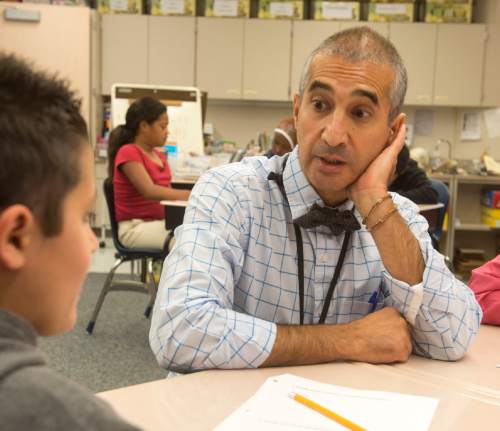This is an archived article that was published on sltrib.com in 2016, and information in the article may be outdated. It is provided only for personal research purposes and may not be reprinted.
— William Bligh, captain of HMS Bounty
You might want to ask a teacher if the above quotation is accurately attributed. The circumstances under which it was supposedly uttered. Who Capt. Bligh was. Whether the statement is sarcasm or irony. And how it applies to the state of education in America.
If, that is, you can find a teacher to ask.
The United States in general, and Utah in particular, are facing an acute shortage of classroom teachers. And, while there has never been a time when a dearth of teachers would be acceptable, the next generation of students is going to be at a huge disadvantage if the number of bright people willing to take on a career in education fails to meet the demand.
The simple demographics of the situation in Utah, and in much of the nation, are that student bodies are increasingly diverse, in heritage, language and skill levels. But the demands of the global 21st century economy will not wait for us, or anyone else, to sort things out.
Technological innovations can help. But there will never be a silicone substitute for a flesh-and-blood teacher helping young people to grasp the increasingly complicated concepts that will be necessary to survive in the years to come.
Long hours, low pay and a lack of appreciation have always been a problem for professional teachers. In some states, elected officials at least give lip service to the idea that those problems should be addressed, even if tight budgets and political gamesmanship leave those pledges unfulfilled.In Utah, though, the climate is often downright poisonous.
Teachers as a profession, and public education as an institution, get far too little respect, much less money, from politicians eager to score anti-union, anti-intellectual points with their constituencies. Constituencies bent far to the right by the state's caucus and convention nominating system.
Gov. Gary Herbert, to his credit, has put most of his political muscle behind long years of improving funding for public schools. As he says, it isn't all about the money, but it's some about the money.
It's also about treating teachers as professionals, more like doctors and lawyers, not micromanaging their activities, blaming them for the failings of the larger society and testing everyone to death.
It is no wonder, then, that fewer people wish to be teachers. Or that more of those already in the profession are moved to circle the wagons, reject even valid criticisms and make the evaluation of teachers and schools, difficult in the best of circumstances, even more complicated.
The people of Utah have every right to expect that the teachers to whom we entrust our money — and our children — do the best job humanly possible. But those teachers have a right to a more realistic expectation of what that is, and of what resources — and respect — they will need.



